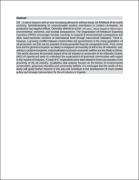The Nascent Oil Industry in Uganda: Exploring its Impact on Ecotourism and Livelihoods
Abstract
Oil – a scarce resource with an ever-increasing demand is without doubt, the lifeblood of the world economy. Notwithstanding its unquestionable positive contribution to modern civilisation, oil production has negative effects. Generally referred to as the ‘oil curse’, these negative effects have environmental, economic, and societal consequences. The Organization of Petroleum Exporting Countries (OPEC) encourages member countries to respond to environmental consequences and other socio-economic concerns at international level through macro-level indicators. There is, however, a growing conflict between communities and governments in the rising geopolitics of oil production, and this has the potential of being propelled beyond manageable levels. Food, wood fuel and the general ecosystem are likely to disappear permanently if left to the oil industries, and, without a pristine ecosystem, industrialisation and socio-economic welfare are less likely to thrive. This article discusses the possible impact of the oil industry on ecotourism in the Albertine Graben (AG) of Uganda and seeks to understand the expectations of grassroots communities with regard to the nascent oil industry. A total of 47 respondents were interviewed in three sub-counties in the proximity of the oil industry. Qualitative data analysis focuses on the themes of environmental conservation, grassroots education and community welfare. It is envisaged that the results of this study will guide further research in the area and contribute to the development of much needed policy and strategic interventions for the oil industry in Uganda.
Collections
- Research Articles [133]

